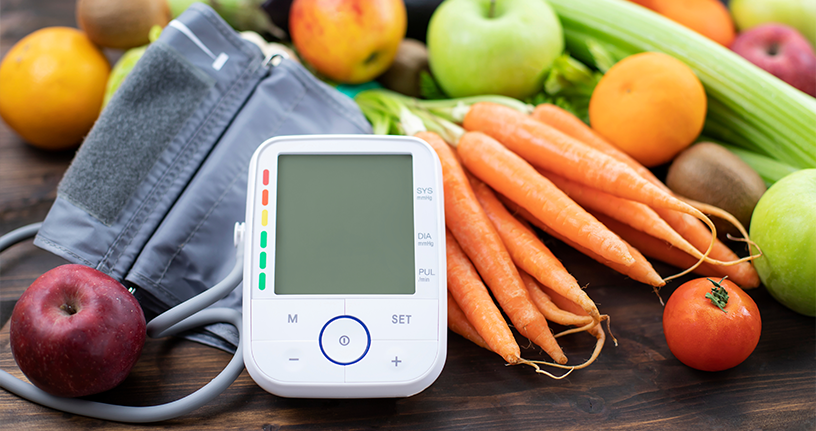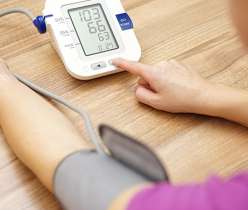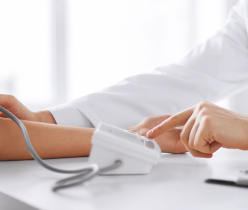Hypertension or high blood pressure is difficult to manage. Every patient is different, so choosing and tailoring approaches varies as per individual needs. This information guide offers ways to discuss high blood pressure and provides strategies to control it.
Do you have a normal BP range? Get your normal BP levels checked to know the result. If you have been diagnosed with high blood pressure, you should monitor your blood pressure regularly. Tracking your numbers can help you know of any changes and help you detect patterns.
Tracking blood pressure numbers also helps reveal if your changes are working.
-
- Normal blood pressure for women and men– Systolic- less than 120 and Diastolic: less than 80
- Increased blood pressure- Systolic: 130- 129 and Diastolic: less than 80
- High blood pressure (hypertension)- Systolic: 130-139 or Diastolic: 80-89
Stage 1
-
- High blood pressure (hypertension)- Systolic: 140 or higher or Diastolic: 90 or higher
Stage 2
-
- Hypertension crisis- Systolic: 140 or higher or Diastolic: higher than 120
Effective strategies to manage hypertension
High blood pressure is one of the major public health concerns, and its prevalence is rapidly increasing among urban and rural populations. Maintaining a normal blood pressure range can significantly reduce cardiovascular risk. Lifestyle measures and pharmacological means can achieve a normal blood pressure range. Lifestyle modifications should be the initial approach to achieving healthy blood pressure levels. These include dietary changes (increasing potassium intake, reducing salt, alcohol avoidance, and high-fat diet control), tobacco cessation, weight reduction, physical exercise, and stress management.
You may have heard of all such changes and how dramatically they can change your lives, but incorporating them into your daily routine is the toughest part. The following strategies can help you manage your blood pressure.
-
- Discussing the consequences: Hypertension is serious.
Hypertension (high blood pressure) is largely asymptomatic, making discussing its effects a more difficult barrier for healthcare professionals to address. It is also called a silent killer that quietly damages blood vessels and contributes to serious health issues.
Most people do not show any signs of high blood pressure. If left untreated and unable to control your blood pressure, you can experience some serious complications, including vision loss, stroke, and heart attack. Moreover, hypertension is the second leading cause of kidney failure, which can lead to years of dialysis. Elevated blood pressure levels can cause damage to your blood vessels. The damage can, in turn, give rise to impotence and other sexual issues.
-
- Lifestyle medications may help!
Making lifestyle changes to reduce high blood pressure can be just as important as taking the medicine. According to a research study, a low-sodium diet helps to reduce the risk of heart problems.
-
- Salt is made up of sodium, which is present in almost every food we buy, especially processed, packaged, and restaurant foods. Many people consume too much sodium, which can harm your health. Checking food labels helps us know how much sodium is in our food. Ensure you do not eat over 2300 mg of sodium daily, around a teaspoon of salt.
- It is important to note that restaurant food can carry a lot of hidden sodium. When cooking meals at home, try to use less processed foods. Fill your half plate with fruits and vegetables. You can also consult a nutritionist who can help you suggest healthy food options that you can use to prepare healthy meals at home.
-
- Stick with medicine and lifestyle schedule
Many patients cannot reach average blood pressure levels for numerous reasons, including medication adherence. Read below to understand how you can follow your medication schedule.
-
-
- You should avoid throwing away your medicine packages. Keep them safe and bring them to your next doctor’s appointment. This helps to track your medicines.
- Your healthcare professional may provide a medication log to help you take your medicine daily.
- If you carry a smartphone, you can click a picture of each medicine container before you revisit your healthcare specialist. This helps you discuss what you’re taking and what it’s for with your healthcare provider.
- Try taking your blood pressure medicine on time like you do your other daily activities.
- Your medicines help control your high blood pressure, lowering the risk of heart attack or stroke. Taking blood pressure medicine helps reduce the heart’s workload, reducing your risks of complications later.
- Many people don’t like the idea of taking medicine every day. They think of it as a burden. However, it doesn’t take a lot of effort, but it does a lot of good. It protects you from life-threatening complications and saves your life.
- Your healthcare providers will work with you to adjust your medicines to minimize side effects. Current medications have fewer side effects than you have heard or experienced before.
- Almost everyone who suffers from hypertension is interested in natural ways to control their blood pressure. It can be done by eating healthy and being physically active. But, taking medicines while making healthy lifestyle changes is the best way to achieve normal blood pressure levels.
- Healthy changes in your diet and lifestyle can improve your overall health and lower your risk of developing other health issues. If you have been consistent with these changes, you might be able to discontinue taking this medicine.
- Many people don’t like chemicals, but these antihypertensive drugs have been studied and prescribed to patients for years. Taking a small dosage may prevent you from consuming more medicine later.
-
FAQ’s
1: What is considered normal blood pressure for both men and women?
Answer: Normal blood pressure for women and men is systolic less than 120 and diastolic less than 80.
2: How can I reduce my risk of hypertension?
Answer: You can reduce your risk of hypertension by making lifestyle changes, including increasing potassium intake, reducing salt, avoiding alcohol, controlling a high-fat diet, quitting tobacco, maintaining a healthy weight, engaging in physical exercise, and managing stress.
3: Why is it important to monitor blood pressure regularly if you have high blood pressure?
Answer: Regularly monitoring your blood pressure helps you detect any changes and patterns, ensuring that your efforts to manage high blood pressure are effective.
4: What are the potential consequences of untreated high blood pressure?
Answer: Untreated high blood pressure can lead to serious complications such as vision loss, stroke, heart attack, kidney failure, impotence, and other sexual issues.
5: Are lifestyle changes alone effective in managing high blood pressure, or do I need medication?
Answer: Lifestyle changes are important, but medication may also be necessary to achieve and maintain healthy blood pressure levels. Consult with your healthcare provider to determine the best approach for you.
6: Is BP different in male and female?
Answer: No, blood pressure (BP) ranges are generally the same for both males and females. Normal BP for adults is systolic less than 120 and diastolic less than 80, regardless of gender.
7: Is 140 90 normal BP for seniors?
Answer: A blood pressure reading of 140/90 is not considered normal for seniors or any adults. It falls into the category of “High blood pressure or hypertension.
8: What is stroke level blood pressure?
Answer: Stroke-level blood pressure is typically defined as a systolic (the top number) of 140 or higher or a diastolic (the bottom number) of 90 or higher. When blood pressure reaches or exceeds these levels, it’s considered dangerously high and requires immediate medical attention to prevent stroke.
9: Does caffeine raise blood pressure?
Answer: Yes, caffeine can temporarily raise blood pressure. Caffeine is a stimulant that can lead to a short-term increase in blood pressure, especially if consumed in large amounts or if you are sensitive to its effects.
10: Can drinking water lower your blood pressure?
Answer: Yes, drinking water can help lower blood pressure, especially if you are dehydrated. Dehydration can cause blood vessels to narrow and lead to an increase in blood pressure.
Conclusion
Normal blood pressure for adults is 120 mm/hg. While there is no cure, using medicines and making lifestyle changes can improve your quality of life and cause a significant reduction in the risk of associated complications such as stroke, kidney disease, heart disease, and more.




